Louis Vuitton is painting boarded up windows its signature orange shade, revealing a dystopian new reality prior to a historic election

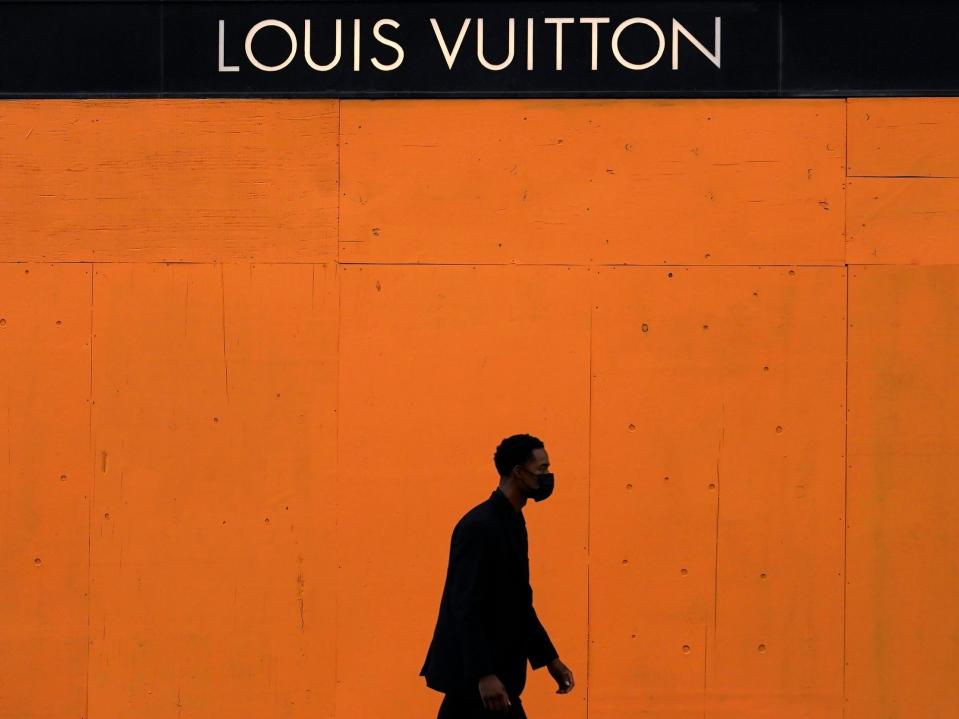
Louis Vuitton is using plywood and steel that is painted its signature shade of orange to board up stores prior to possible protests, riots, and looting following the election.
The Louis Vuitton-branded boards first made their appearance early in the pandemic.
The dedication to aesthetic sends an unnerving message — that no amount of changes, protests, or riots will even temporarily stop brands like Louis Vuitton from trying to sell things.
Louis Vuitton is painting boarded up windows its signature shade of orange, as the luxury retailer prepares for possible unrest around the 2020 presidential election.
Shopping destinations across America are bracing for the election, Business Insider's Thomas Pallini reports.
Rodeo Drive in Beverly Hills is shutting down completely. In Chicago, the Magnificent Mile will be armed with "everything from snow plows to salt trucks" to control crowds, Rich Gamble, chairman of the Magnificent Mile Association, told Bloomberg. Plywood and steel are in high demand, CBS News reports, as stores board up their windows to protect against riots and looting.
Yet, despite these concerns, some brands remain dedicated to their established aesthetic.
Prime among the luxury brands refusing to allow potential unrest to disrupt their branding is Louis Vuitton. The retailer has been painting steel and plywood barriers its signature shade of orange at stores across the US.
It shows a staunch commitment to the brand. But it can also come across as deeply dystopian.
Income inequality has been front and center this election, but that hasn't stopped some retailers from doubling down on luxury branding, even though it may seem out of step with the average shoppers' concerns.
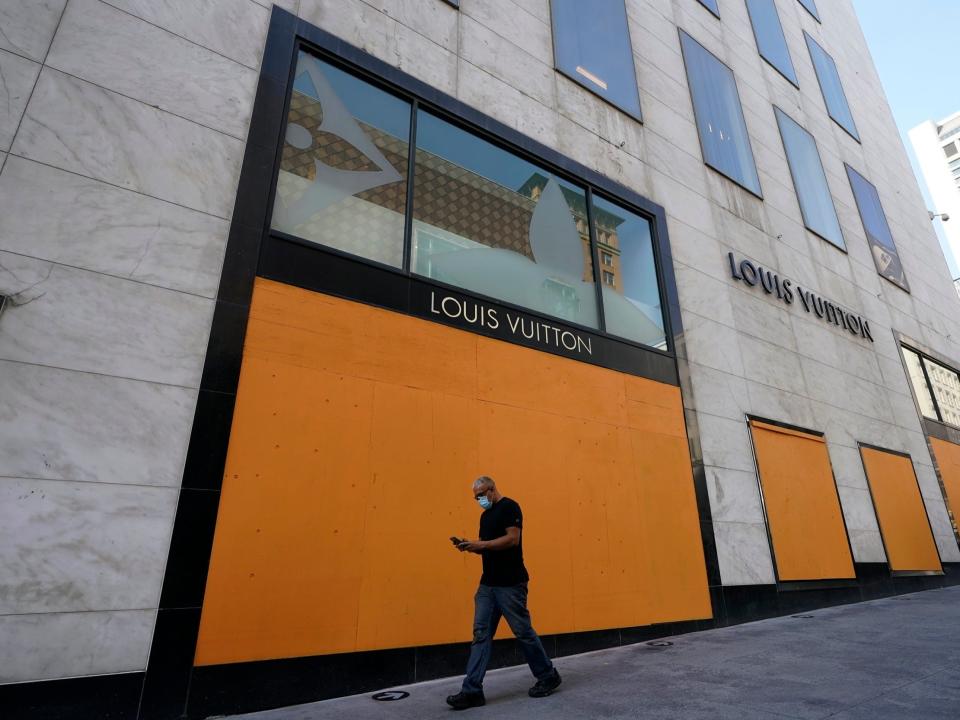
With income inequality reaching record highs in recent years, addressing the divisions between the rich and poor in the US emerged as one of the biggest topics of the election. In February 2019, Insider's Eliza Relman reported that taxation and inequality were the center of the 2020 race.
"Class war is the only war that's necessary and apparently the only one conservatives wouldn't support waging for two decades without end," Sean McElwee, a progressive activist and cofounder of Data for Progress, told Relman at the time.
The pandemic and its "K-shaped" recovery have exacerbated many of these divisions.
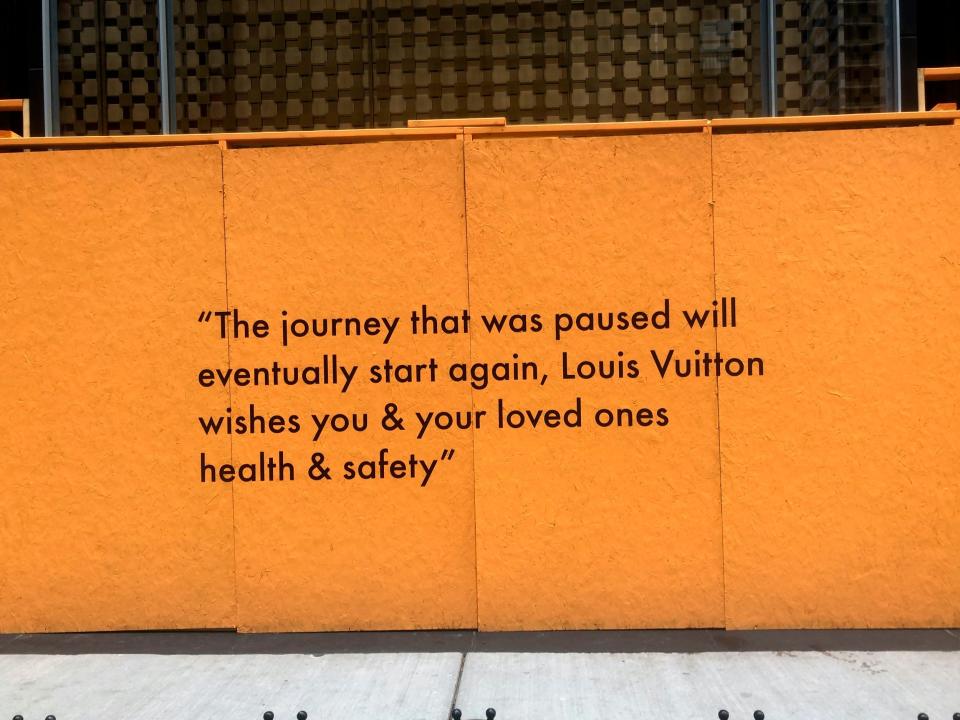
Some experts say that the US could see a "K-shaped" recovery from the pandemic, as wealthy professionals recover but those working low-paying jobs do not. Former Vice President Joe Biden has repeatedly referenced the concept while campaigning.
"Billionaires have made another $300 billion because of his profligate tax proposal, and he only focused on the market," Biden said in the first presidential debate. "But you folks at home, you folks living in Scranton and Claymont and all the small towns and working class towns in America, how well are you doing?"
Louis Vuitton first debuted its signature boarded up windows early in the pandemic, when stores closed due to COVID shutdown.
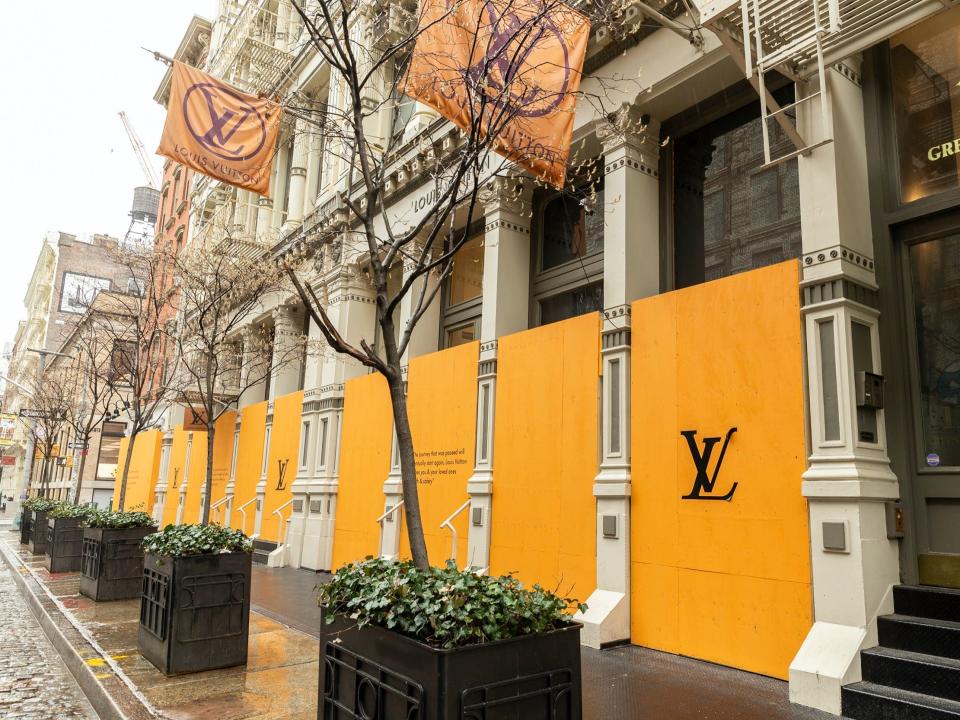
Louis Vuitton, like many luxury retailers, were forced to close stores around the world because of the pandemic.
Parent company LVMH reported in October that the fashion brand's sales have recovered from the early pandemic. The company reported revenues of 11.96 billion euros, equivalent to $13.99 billion, in the third quarter, The Wall Street Journal announced.
After Louis Vuitton stores reopened, some boarded up windows again during protests over the summer.

Louis Vuitton faced pushback when the brand did not immediately speak out in the days following the death of George Floyd, as other companies made statements condemning police brutality and white supremacy.
Backlash grew after designer Virgil Abloh publicly criticized people looting shops, followed by a donation of just $50 to a bail fund. (Abloh and Vuitton released a video in support of Black Lives Matter in late May.)
Boarding up windows can be a way to protect merchandise, as well as make workers' jobs easier and safer.
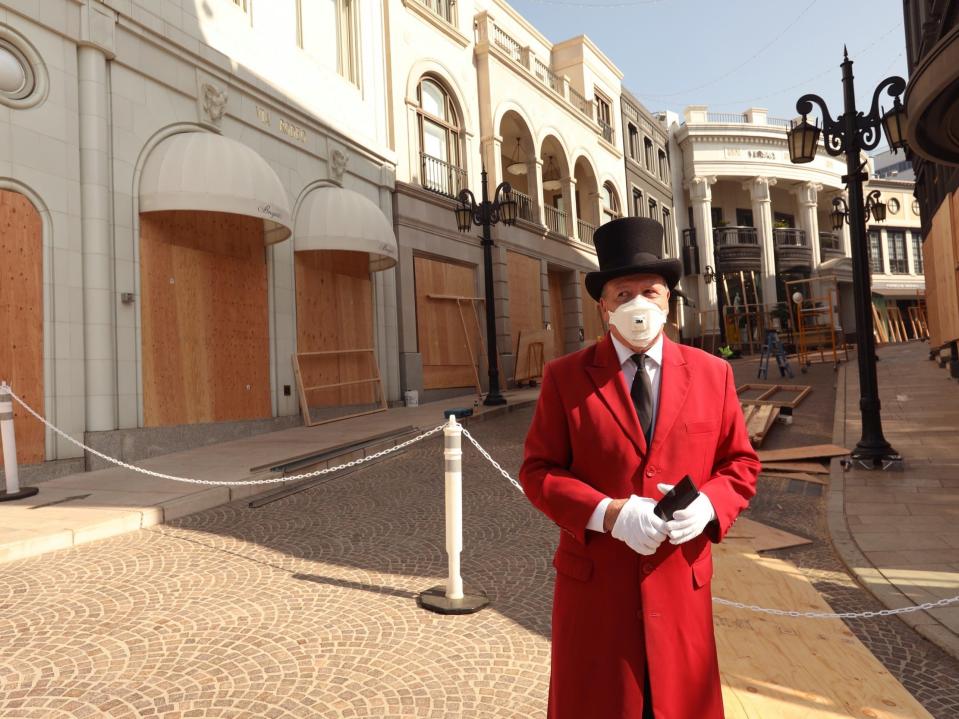
Louis Vuitton is far from the only brand boarding up windows and taking precautions, both during the protests over the summer and before the election.
Axios reports that protests cost more than $1 billion in damages across the US in a 13-day period from May 26 to June 8.
However, the dedication to branding — down to the shade of orange — can be unnerving.

Acclimating to the "new normal," for the sake of executives, investors, and even employees, makes sense. But, it can also feel dystopian, a queasy attempt to force something from another time to function even when things have changed for the worse.
The orange-tinted barriers feel like a ramped-up version of brands co-opting the hellish nature of 2020 in ad campaigns. It's two things that feel inherently at odds — 2020 being horrible, the need to advertise — and cobbling them together into a twisted version of normalcy.
Stores need protection. But, luxury brands rely on their aesthetic to be able to charge $3,000 for a handbag. So, we have orange plywood barriers outside Louis Vuittons across the US.
In some ways, the barriers are a microcosm of what is wrong in America as the nation heads into the election.

There is a reason why populists on both sides of the aisle have found support, even as some of the right argue that Democrats like Bernie Sanders, Elizabeth Warren, and Alexandria Ocasio-Cortez fan the flames of class warfare. Major businesses and wealthy Americans have flourished in recent years, enjoying the success that is at odds with reality for most people in the country.
Income has basically stagnated for most workers when adjusted for inflation, but net productivity has been growing by 70% since the early '70s. In the pandemic, private jet travel skyrocketed as millions of people lost their jobs. Small businesses are struggling to survive, but shares of the largest companies in the nation are set to explode.
Louis Vuitton did not respond to Business Insider's request for comment on its barriers, which are ultimately pretty harmless. But, they do show just how dystopian this year can be.
Even as the country prepares for vote-counting delays, riots, and a continuing pandemic, absolutely nothing will stop brands from trying to sell people things in the "new normal."
Read the original article on Business Insider

